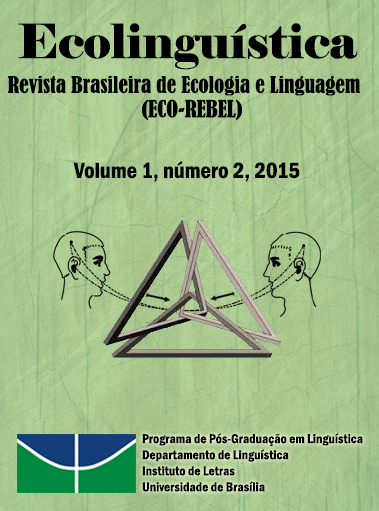Ecologia da língua como teoria linguística
Keywords:
language ecology, patterned behaviour, holistic, dynamic, and interactive.Abstract
Language ecology was proposed by Einar Haugen in 1972 as the study of the interaction of any given language and its environment. Despite some use of the term in the literature, sociolinguists have failed to develop the potential that Haugen saw in an ecological approach. Recent developments in ecological thought, however, when applied to language, raise questions about many basic assumptions of conventional linguistics. For example, from an ecological perspective, language is not a rule-governed system, but a form of patterned behaviour arising from the needs of human sociality: communication, culture, and community. As Haugen foresaw, language ecology offers an exciting alternative approach to linguistic theory.
Downloads
References
BARRON, C.; BRUCE, N., ; NUNN, D. ‘Introduction’ a Knowledge and Discourse: Towards
an Ecology of Language. Harlow: Pearson Education, 2000, p. 1-12.
CRYSTAL, D. Linguistics. Harmondworth: Penguin, 1990.
DUPRÉ, J. The Disorder of Things: Metaphysical Foundations of the Disunity of Science. Cambridge, Mass: Harvard University Press, 1995.
GARNER, M. The Swedish and Russian Speech Communities in Melbourne in the Context of Developing a Theory of the Ecology of Language. Tese de doutorado, Universidade de Melbourne, 1986.
____. Ethnic languages in two small communities: Swedish and Russian in Melbourne. International Journal of the Sociology of Language 72, 1988, p. 37-50.
____. Language: An Ecological View. Oxford: Peter Lang, 2004.
GIDDENS, A. The Constitution of Society. Cambridge: Polity Press, 1984.
HAARMANN, H. Language in Ethnicity: A View of Basic Ecological Relations. Berlin: Mouton de Gruyter, 1986.
HALLIDAY, M. Language as Social Semiotic. New York: Chapman and Hall, 1994.
HAUGEN, E. The Ecology of Language. In: DIL, A. S. (ed) The Ecology of Language: Essays by Einar Haugen, Stanford: Stanford University Press, 1972.
HAYWARD, T. Ecological Thought: An Introduction. Cambridge: Polity Press, 1995.
KÖVECSES, Z. Metaphor: A Practical Introduction. New York: Oxford University Press, 2002.
LADYMAN, J. Understanding the Philosophy of Science London: Routledge, 2002.
MACKEY, W. The Ecology of Language Shift. In: The Ecolinguistics Reader, (edited by FILL, A. ;MÜHLHÄUSLER, P. ). London: Continuum, 2001, p. 67-74.
MÜHLHÄUSLER, P. Linguistic Ecology. Linguistic Change and Language Imperialism in the Pacific Region. London: Routledge, 1996.
NELDE, P. Ecological aspects of language contact or how to investigate linguistic minorities. Journal of Multilingual and Multicultural Development 10/1, 1989, p. 73-86.
ORTEGA Y GASSET, J. Man and People. New York: Norton, 1963.
SAPIR, E. Selected Writings of Edward Sapir. (ed. D. Mandelbaum) Berkeley: University of California Press, 1949.
SAUSSURE, F. Course in General Linguistics (trans. Wade Baskin) London: Peter Owen, 1916.
WHORF, B. Language, Thought and Reality: Selected Writings of Benjamin Lee Whorf (edited by CARROLL, J.) Cambridge, Mass: Technology Press of MIT, 1956.
WIJAYANTO, A. An Ecolinguistic Perspective on the Languages Used by a Javanese in
Banjarmasin-South Kalimantan (a case study). Kajian Linguistik dan Sastra 15/ 29, 2005, p. 80-92.
Kajian Linguistik dan Sastra, Vol. 17, No. 33, 2005: 91 - 101.
http://pt.scribd.com/doc/27175229/Garner-Mark-2005-Language-Ecology-as-Linguistic-Theory (20/04/2011).
Downloads
Published
How to Cite
Issue
Section
License
Authors who publish in this journal agree to the following terms:
Authors retain copyright and grant the journal the right of first publication. The work is simultaneously licensed under the Creative Commons Attribution License allowing the sharing of the work with acknowledgment of the authorship of the work and initial publication in this journal.
Authors are authorized to enter into additional contracts separately for non-exclusive distribution of the version of the work published in this journal (e.g., publishing in institutional repositories or as book chapters), with acknowledgment of authorship and initial publication in this journal.
Authors are allowed and encouraged to post and distribute their work online (e.g., in institutional repositories or on their personal page) at any point before or during the editorial process, as this can bring about productive revisions as well as increase impact.
Citation of published works (See The Effect of Free Access).



3.png)



